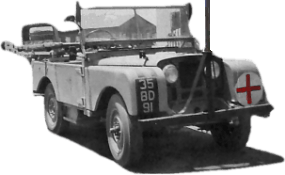
National Service in the Royal Army Medical Corps
Dr John A Lunn • Captain • RAMC • 1955-1957
In the Middle East and Cyprus

One morning when just about to have some coffee, a soldier in great distress rushed in saying a private had shot himself in the NAAFI. It turned out the private had been playing Russian roulette for one or two days and getting away with it. It seemed that he was an attention seeker and this activity certainly gave him attention from his comrades. Russian roulette is where just one bullet is left in the chamber of the revolver and the chamber is then spun before closing it ready for firing. Theoretically the bullet should settle at the bottom of the chamber and therefore not be in the firing position. This of course does not always happen and the bullet may stop in the firing position as tragically happened in this case. As a matter of interest after this tragedy I took all the bullets out of my revolver bar one and spun the chamber. It stopped with the bullet in the firing position, so I would only have played one game of Russian roulette!
Donor blood only keeps for three weeks. There was no supply from the UK and we had to obtain all blood from our own troops in Cyprus. John Turk and I were responsible for running the blood supply. We both had experience of this before coming into the Army, but John's experience was greater than mine. Because of the relatively short survival time of blood we did not keep a large permanent stock in order to avoid waste. We therefore had three degrees of blood donors among the troops. For acute emergencies there was a small panel of troops based very close to the BMH who could and were prepared to come in a matter of minutes for their blood to be given to a wounded soldier waiting on the operating table. The next group of donors were posted about a quarter of an hour away and would be called upon to give blood for follow up blood transfusions once the acutely wounded soldier had received his initial survival treatment. More troops were also available who were posted further away.
When blood was very urgently needed in the operating theatre there was much tense activity to supply it. Donors were bled by me and before it could be given, it had to be not only checked again for it's blood group, but also cross-matched against the recipient's blood. This had to be done with the utmost speed knowing that a soldier was at risk of dying, but at the same time it obviously had to be done with the utmost accuracy. It is to John Turk's great credit that no errors occurred. All donors were given a tin of beer as a "thank you" and they always departed back to their units in a happy frame of mind. The experience of dealing with these willing volunteers was inspiring and I was full of admiration for their wonderful spirit. It was a privilege to have been associated with such wonderful people.